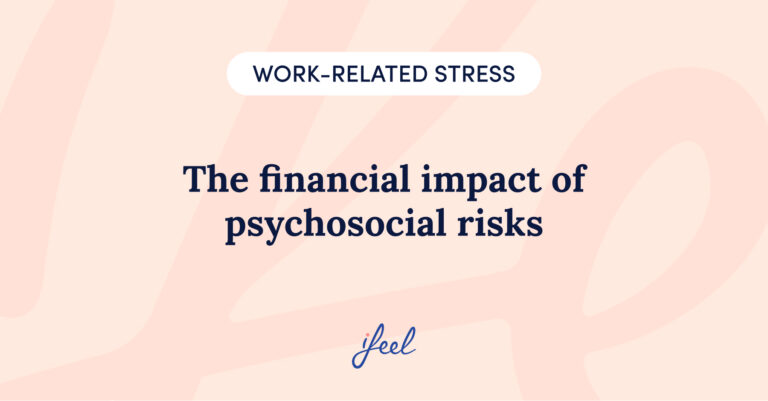You might think industrial and organisational psychology is all about how we organise ourselves and others, making lists and plans. But that’s not the case! This dynamic field, closely tied to occupational psychology, is rapidly gaining traction in the corporate world, offering profound insights into workplace behaviour and boosting company performance.
In this post, we will delve a little deeper into the essential field of industrial and organisational psychology if we aim to improve occupational health.

What is industrial and organisational psychology?
Industrial and organisational psychology is the area of psychology concerned with the study and analysis of the behaviour of human beings within an organisation. This branch of psychology uses scientific methods to understand and solve problems related to the behaviour of employees and the structure of organisations.
As is evident, industrial and organisational psychology, i.e. psychology in business, is closely related to what is traditionally known as Human Resources, but it goes far beyond that of personnel selection.
Organisational psychologists analyse diverse areas such as personnel selection, training, professional development, performance evaluation and work motivation. Their work is crucial in designing strategies to improve the work environment and promote a healthy and productive corporate culture, as research shows that motivated employees are significantly more productive and less likely to leave their jobs.
It involves analysing the needs, motivations and characteristics that govern people’s behaviour, their thought patterns and, of course, their individual functioning and also in the context of their relationships, including group dynamics. As you are probably thinking, putting psychology at the service of organisations makes companies more efficient in crucial areas such as attracting, developing and retaining talent, social benefits for employees, internal communication or the axes of leadership, hierarchies and team cohesion.
Benefits of industrial and organisational psychology
Industrial and organisational psychology offers practical, evidence-based solutions that help large companies improve their efficiency and the well-being of their employees. Not for nothing are organisational psychologists seeing increased demand for their services due to the growing awareness of the importance of mental well-being in the workplace.
In fact, statistics have shown that creating psychologically safe work environments and restructuring work to address employee mental health are prominent trends in 2023.
This is how we can highlight some benefits of Industrial and organisational psychology in work environments, such as:
1. Improving performance and productivity
Industrial and organisational psychology is vital in optimising employee performance and productivity. By understanding employee motivations and behaviours, HR managers can implement training and development programmes that align individual goals with those of the company. This not only improves job performance, but also increases employee satisfaction and engagement.
2. Improve talent recruitment and retention
One of the biggest challenges for large companies is attracting and retaining talent. Organisational psychologists develop and apply selection techniques to recruit suitable candidates for each position.
They also implement retention strategies that minimise staff turnover, which is especially important in companies with significant replacement costs.
3. They are able to increase work motivation
Mental well-being at work is an essential component of maintaining a healthy work environment. Organisational psychologists develop mental well-being solutions that include counselling, stress management workshops and work-life balance programmes.
These initiatives are instrumental in reducing stress and preventing burnout, thus promoting higher motivation, job satisfaction, and lower absenteeism.
4. Improving organisational culture and work environment
Organisational culture and work environment are key determinants of employee behaviour and attitude. Organisational psychologists work with business leaders to create and maintain a culture that fosters collaboration, innovation and mutual respect. A positive work environment not only attracts talent, but also drives employee loyalty and engagement.

Workplace psychology in blurred environments
Today, complex business environments are often described by the acronym VUCA, which refers to the ideas of volatility,uncertainty, complexity and ambiguity.
These characteristics of the so-called business ecosystem pose a great challenge for organisations, not only to improve their productivity, but also to promote the psychological well-being of the people in them. This is why industrial and organisational psychology is becoming increasingly important for those companies that want to survive in this VUCA environment and, moreover, adapt and grow within it.
In this sense, companies must train their capacity to adjust not so much to change as to the characteristics of change that determine the current organisational context. If change were to occur slowly, consistently, predictably, and smoothly, companies would not need to apply the knowledge of industrial and organisational psychology to accommodate that movement well.
However, as the idea of the VUCA environment indicates, what industrial and organisational psychology observes and tries to understand is a tendency towards rapid, contradictory, unpredictable, intense change.
Judith Palau, People Director at Mad Collective, an ifeel partner company, shared her opinion on this:
“In the past, my team would manage all of this. Now, with ifeel as our partner, we are able to provide a higher level of well-being management while also opening up time for my team to work on other beneficial projects for our employees.”

How does industrial and organisational psychology help to navigate VUCA environments?
This ability of organisations to relate appropriately to the changes brought about by the passage of time can be broken down into three factors or dimensions that every smart company must learn to manage, and which an organisational psychologist can help to channel.
1. Flexibility-plasticity
This refers to the present. It has to do with the organisation’s ability to adapt on the fly to changing circumstances, which force it to rethink processes and take detours in some decisions that were taken for granted, through openness and permeability to external influences that are interesting to incorporate.
2. Anticipation-intuition
This refers to the future. Everything that has to do with strategic planning, imagining solutions to needs or challenges that have not even arrived yet, as well as foresight and prevention, especially in terms of caring for the psychological well-being of employees.
In short, any company that properly applies the principles of industrial and organisational psychology must have a good capacity to intuit and see beyond, preferably beyond where its direct competitors can see.
3. Learning-educability
Refers to the past. Learning is the ability of an organism to modify its behaviour in response to an experience. That is why we speak of ‘learning from experience’ and therefore of accumulating knowledge, being instructed or educated in some subject.
The learning-educability dimension concerns the past, that is, the company’s capacity to take advantage of what is happening and incorporate it into its library of experiences, its ‘history’, to enrich the panel that it will examine each time it faces a challenge and makes decisions about the future.
Why is a psychologist important in a company?
If you are still wondering why a psychologist is important in a company or how to improve the mental well-being of employees, the answer can be summed up in one term: psychological safety.
According to research, psychological safety in the workplace, which allows employees to express concerns without fear of retaliation, is crucial to employee performance and well-being. Creating a psychologically safe environment correlates with better collaboration and innovation results, and such results are achievable when a psychologist is in the company.
Industrail and organisational psychology: benefits of having a psychologist
| Business Psychology Benefits | Description |
|---|---|
| Good for Employee Health | Helps employees better understand themselves, comprehend why they act in certain ways, understand their relationships, become aware of their needs, and train their skills. This individual space represents an opportunity for personal and, therefore, professional growth. |
| Improves Employee Experience | Therapy enhances both performance and the overall employee experience. An employee who feels better about themselves will be more comfortable at work, more self-assured, and more focused on their tasks, positively impacting the overall functioning of the team. |
| Ensures Confidentiality | The online therapy service offered by the company is free for employees and ensures a private and confidential space, protecting the employee’s privacy. |
| Positively Viewed by the Company | The company interprets the use of the service as an employee’s responsibility for their well-being and effective use of available resources, not as a sign of problems. Taking care of oneself through therapy is well-regarded within the company. |
| Convenient, Free, and Beneficial | Although therapy can be emotionally, cognitively, and behaviourally challenging, the advantages outweigh the disadvantages, offering clear benefits for both the employee and the company. |
| Adaptable to Individual Needs | The mental well-being solution has three levels of assistance according to the employee’s needs and level of involvement, allowing for a sequential and personalised process for each individual. |
| Not a Permanent Burden | Therapy involves commitment and consistency, but it is neither permanent nor a burden. It is a process initiated by the employee that progresses at their own pace and needs with the therapist’s support. |
| Flexible Usage | Therapy does not have to be solely about work-related issues. It is a resource the company provides for employees to use according to their needs, even if not directly related to the work environment. |

Mental well-being for large organisations
Implementing industrial and organisational psychology is key for companies to be successful and have a healthy workforce.
To assist in this process, our team of psychologists specialising in industrial and organisational psychology has developed a mental well-being program for companies aimed at helping companies enhance employee engagement and boost productivity.
This collaboration allows HR managers to receive personalised, data-based advice on the most effective measures for detecting employee mental health issues and assessing the workplace climate. It’s the best way to understand their needs.
Moreover, ifeel’s corporate mental well-being solution offers employees a structured mental health care service tailored to their needs at any given time.
We hope you found this article on industrial and organisational psychology interesting. If you want more information about our mental well-being solution for companies, simply request it, and we will contact your team soon.







